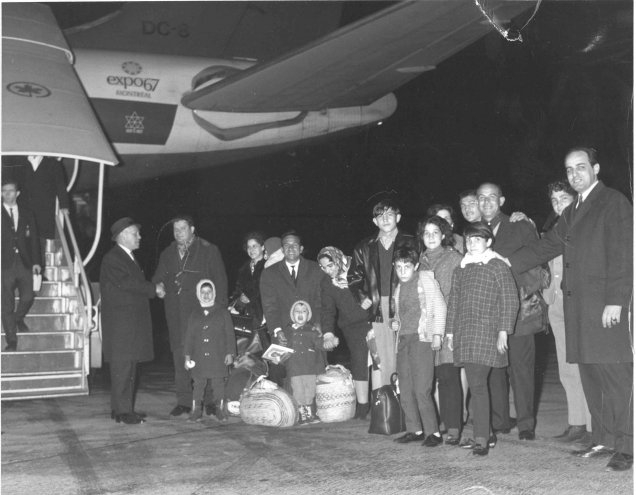Jewish Immigrant Aid Services
The Jewish Immigrant Aid Society of Canada was established in 1920 by the newly-formed Canadian Jewish Congress (CJC). A Toronto branch was established in Toronto in a storefront office on Spadina Avenue, but the organization was rudimentary, and as the enthusiasm that spurred the founding of CJC died out, JIAS soon faltered. Then in 1922 it was taken over and reactivated under the cooperative support of the Federation of Jewish Philanthropies of Toronto, B'nai B'rith and the Council of Jewish Women. JIAS was legally incorporated on 30 August 1922. It also operated under the moniker of the Emergency Jewish Immigrant Aid Committee, and it changed its name to Jewish Immigrant Aid Services in 1954.
Charged with organizing emergency relief for European Jews in distress, JIAS became the central agency of the Jewish community to facilitate the lawful entry of Jewish immigrants into Canada, and provided them with welfare services, transportation, and assistance with accommodation and employment after their arrival. In addition, JIAS offered consultation services for sponsors of potential immigrants, ran a competitive foreign remittance service, and campaigned to counter the activities of unscrupulous steamboat agents, lawyers and influence peddlers, or “shtadlanim,” who often victimized immigrants and sponsors alike.
In conjunction with similar efforts by the CJC, JIAS was also actively engaged in negotiating for the increased admission of Jewish immigrants to Canada. In 1923, the federal government instituted a permit-based immigration program and JIAS competed with travel agents and solicitors in the private sector for these limited quota permits. After combating the anti-immigration policies of the Depression era, the outbreak of war in 1939 virtually closed the already limited avenues for immigration.
JIAS Canada was organized into a National Office in Montreal and regional offices in Winnipeg (Western Region), Toronto (Central Region) and Halifax (Eastern Region). The Central Region covered Ontario, and established a full-time head office in 1935 at 399 Spadina Avenue in Toronto (hence the Central Region was sometimes called simply the Toronto Office). The office later moved to 265 Spadina Avenue. JIAS Toronto’s board of directors met on a regular basis at different locations in Toronto, including 206 Beverley Street and in the Talmud Torah building at 9 Brunswick Avenue. The first JIAS Toronto board included notable Toronto residents such as Henry Dworkin, Mrs. Draiman, Mr. Kronick, Dr. Brodey and Mrs. Willinsky. The role of the board was to oversee the operations of the Central Region. It rendered decisions on issues relating to finances, procedures and policies, negotiations with the federal Immigration Branch, as well as individual cases that required their attention.
General meetings of the Central Region membership were held annually. The 1943 JIAS constitution states that regional annual meetings were to be held for “receiving and considering reports,” holding nominations and elections for the executive, and discussing JIAS’s program and policies.
In the post-war era, JIAS shifted its focus to renewed efforts on behalf of individual claimants and community support, while the focus for lobbying for a reversal of Canada's immigration policy fell increasingly under the jurisdiction of the CJC. A boom in immigration between 1947 and 1952 saw the arrival of large numbers of Jewish immigrants to all parts of Canada and the Toronto Office of JIAS renewed its efforts to meet the needs of this new influx. Major world events also sparked other waves of immigration from Hungary, Czechoslovakia, North Africa and Russia, to which JIAS responded in turn. JIAS worked in conjunction with other immigrant aid societies such as HIAS, the Hebrew Immigrant Aid Society, in the United States, to facilitate immigration to the United States, and later to Israel, where many of the immigrants and refugees coming to Canada had family and ultimately settled.
JIAS continues to be a vibrant and active organization, assisting with the immigration and settlement of new immigrants from countries around the world as well as providing support and counseling for newly-arrived individuals and families.
